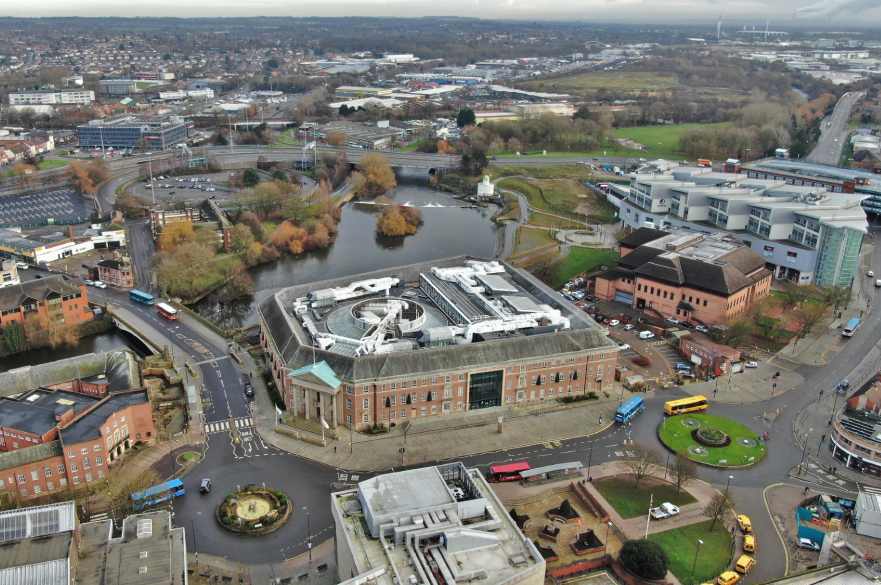At the end of the most challenging financial year yet, Derby City Council managed to bring down its in-year overspend for the year ending March 2024 while keeping strict spending controls in place.
With predictions of a £6.5m overspend six months into the 2023-2024 financial year, the Council was able to reduce this to £4.4 million by the year end. Rising costs in social care, compounded by continued high inflation, caused the Council to experience over £20m of in-year unbudgeted pressures. The Council put immediate measures in place to mitigate this, including only recruiting where staff vacancies were critical to services, and continued to approve spending only for essential items and services. These mitigations resulted in approximately £7m being offset from the in-year pressures.
The main reasons for the overspend include continuing pressures on children’s and adults’ social care services, particularly the cost of complex placements for vulnerable children and adults, and the nationally-set pay award reflecting an inflation figure which remained high. But the biggest overspend last year was on homelessness and temporary accommodation. During 2023-2024, there were 2,486 homelessness approaches and there have already been a further 593 in the first quarter of this financial year. All of these pressures have not been adequately accounted for in the money the Council receives from Central Government.
Overall the picture in Derby compares favourably with nearby councils which saw an overspend in the tens of millions. All local authorities are facing the same challenges, due to pressure on services that councils have to provide, mostly caused by factors beyond their control. These pressures show little sign of easing this year.
Nationally, at 31 December 2023, the number of homeless households in temporary accommodation was up by 12% compared to the year before. Households with children in temporary accommodation was up by 15%.
For social care, Derby saw the cost of placements for children increase by £0.2m during 2023-23, while the cost of the average standard adult social care package rose by 12% to £727.81 per week. Costs to support people living in the community increased by 9% for older adults, and 44% for younger adults.
The local government sector has been calling for reform in the way it is funded by the Government. One-year settlements coupled with ad-hoc competitive grants have left councils less resilient to coping with economic shocks like the Covid pandemic, the war in Ukraine, high inflation rates and the Cost of Living crisis.
Derby is constantly striving to seek ways to deliver good efficient services for its citizens. An example is the purchase of the former student accommodation at Abbey Lodge near the city centre, to house homeless families currently living in temporary accommodation. At the end of June this year, there were 219 families living in Bed and Breakfasts or other nightly-paid accommodation, which is expensive to provide. The flats at Abbey Lodge will significantly reduce those costs, and provide stability and a much better environment for families.
There was also positive news with 86% of spending on capital budgets achieved, meaning the Council has been able to continue to be ambitious for the city and make some significant progress on some exciting projects. New grassroots football and community facilities opened at Derby Racecourse Hub in February 2024, and both the new conference and entertainment venue at Becketwell and the renovation of the Victorian Derby Market Hall are on track for completion in 2025. The Council also managed to make in-year savings of £15.5 million, or 96% of its target. This included saving £3.3 million by controlling job vacancies.
Councillor Kathy Kozlowski, Cabinet Member for Governance and Finance, said:
We’ve taken all the steps we can to manage our finances responsibly, while facing ongoing unprecedented pressures on our services. We’ve continued to be ambitious and deliver for our city. We have not had to follow the path of some other Councils by issuing a Section 114 notice, or requesting Government intervention to avoid this limiting step.
We will have to wait until the Autumn budget to see how the new Government is going to enact its promise to put local government back at the heart of public services, but the noises so far have been positive and there is certainly a suggestion of longer-term funding settlements. The question for us is when they will happen. So we remain pragmatic but quietly hopeful.
In the meantime we will continue to manage the pressures on our services carefully. The last financial year was the most challenging yet for councils across the county, not just Derby City. The continuing rise in demand for services meant we were forced to use our reserves to cover the overspend which was never a position we wanted to be in. However, we recognise that even bigger challenges lie ahead this year and we continue to be vigilant while planning to build back reserves and ensure the Council has sound financial footings for the future.
The Council’s final year end position for 2023-2024 will be presented to Cabinet on Wednesday 14 August. The meeting will be live streamed on the Council’s YouTube channel.
